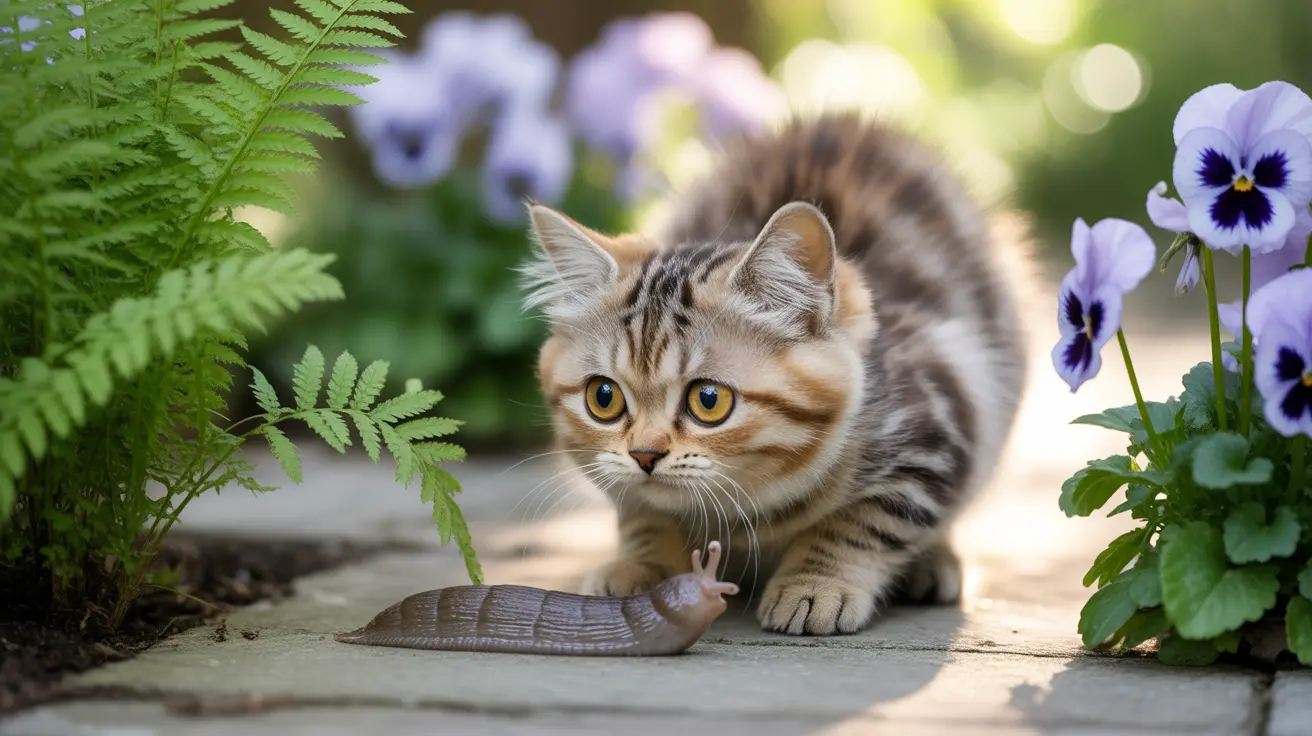Understanding Why Cats Hunt Slugs
If you've ever caught your feline friend pawing at a slimy garden visitor, you might wonder: can cats eat slugs? While cats are natural predators and may be attracted to slow-moving creatures like slugs and snails, allowing them to consume these mollusks can pose serious health risks. Understanding why cats are drawn to these garden creatures and the potential dangers is crucial for responsible pet ownership.
Cats' hunting instincts often lead them to investigate and play with slugs, sometimes even bringing them inside as "gifts" for their owners. This behavior, while natural, needs to be discouraged due to significant health concerns.
Health Risks of Cats Eating Slugs
Lungworm Infection
The most significant natural threat from slug consumption is lungworm infection. Slugs can carry the larvae of Aelurostrongylus abstrusus and other parasitic lungworms that can severely impact your cat's respiratory health. When infected, cats may experience:
- Persistent coughing
- Difficulty breathing
- Wheezing
- Weight loss
- Lethargy
- Pneumonia-like symptoms
Metaldehyde Poisoning
An even more immediate danger comes from slugs that have consumed slug bait containing metaldehyde. This common garden pesticide is extremely toxic to cats, with just a small amount proving potentially fatal. Symptoms of metaldehyde poisoning include:
- Severe tremors
- Seizures
- Hyperthermia
- Rapid breathing
- Excessive drooling
- Potential death without immediate treatment
What to Do If Your Cat Eats a Slug
If you witness your cat eating a slug or suspect they have done so, take these immediate steps:
- Note the time and location of the incident
- Check the area for any slug bait presence
- Contact your veterinarian immediately
- Monitor your cat closely for any unusual symptoms
- Follow your vet's guidance regarding testing and treatment
Prevention Strategies
Garden Safety
To protect your cat from slug-related health risks, implement these preventive measures:
- Use pet-safe slug deterrents
- Remove standing water and damp debris
- Keep garden areas well-maintained
- Consider installing physical barriers in key areas
- Supervise outdoor time, especially during dawn and dusk
Feeding Area Protection
Protect your cat's feeding area with these practical steps:
- Elevate food and water bowls
- Clean feeding areas regularly
- Bring outdoor bowls inside at night
- Use moat-style feeding stations
- Apply pet-safe deterrents around feeding zones
Frequently Asked Questions
Can cats safely eat slugs or snails found in my garden?
No, cats should not eat slugs or snails. While these mollusks aren't inherently toxic, they can carry dangerous parasites and may have consumed toxic slug bait.
What are the health risks to cats from eating slugs, especially regarding lungworm parasites?
Lungworm infection is a serious risk, potentially causing respiratory issues, coughing, breathing difficulties, and in severe cases, life-threatening complications if left untreated.
How dangerous is metaldehyde slug bait poisoning for cats, and what are the symptoms?
Metaldehyde poisoning is extremely dangerous, with even small amounts being potentially lethal. Symptoms include tremors, seizures, hyperthermia, and rapid breathing, requiring immediate emergency veterinary care.
What should I do if my cat eats a slug or snail, or comes into contact with slug bait?
Contact your veterinarian immediately. If slug bait exposure is suspected, this is an emergency requiring immediate medical attention. Monitor your cat closely for any concerning symptoms.
How can I prevent my cat from eating slugs or being exposed to toxic slug baits at home?
Use pet-safe garden products, maintain clean feeding areas, supervise outdoor time, and create physical barriers around areas where slugs are common. Consider indoor-only status for cats in high-risk areas.
Conclusion
While cats may be naturally drawn to slugs, preventing them from eating these creatures is crucial for their health and safety. Focus on creating a safe environment, using pet-friendly pest control methods, and maintaining vigilant supervision during outdoor activities. If you suspect your cat has consumed a slug or been exposed to slug bait, don't wait – contact your veterinarian immediately.






